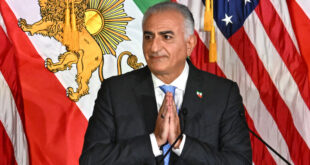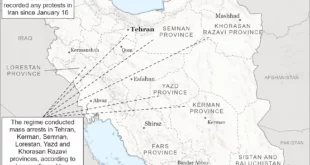 TEHRAN (FNA)- Iran has asked India and Pakistan for an early trilateral meeting to finalize the long-delayed IPI gas pipeline project.
TEHRAN (FNA)- Iran has asked India and Pakistan for an early trilateral meeting to finalize the long-delayed IPI gas pipeline project.
But, Indian sources said that New Delhi is seeking to delay talks until its civil nuclear agreement with the United States wins approval of the US Congress next month.
Iran has separately written to its potential gas buyers, India and Pakistan, seeking dates possibly in August, for a meeting of energy ministers from the three nations in Tehran to sort out remaining outstanding issue impeding implementation of the USD7.4 billion project, officials said.
Following the invitation, Petroleum Minister Murli Deora met External Affairs Minister Pranab Mukherjee, who visited Tehran on July 29-30, to discuss the issue and the two are believed to have agreed to suggest trilateral meeting dates after the US Congress approves the nuclear deal, they said.
After securing approval from the 45 nations that form the Nuclear Suppliers Group, which governs trade in reactors and uranium, the 123 Agreement has to be approved by the US Congress before it adjourns on September 26.
New Delhi does not want its business with Iran to be made an issue during the debate in US Congress, the same sources said.
Interestingly, Tehran sought dates for the trilateral meeting after submitting a non-paper that agreed to the latest Indian demands for shifting of gas sale point, identification of fields for gas supplies and the three nations taking stakes in the project.
Officials said Iran in the non-paper submitted to the Prime Minister’s Office has agreed to shift delivery point of the gas to India-Pakistan border instead of previously envisaged Iran-Pakistan border to cut transit risks in volatile Pakistan.
Shifting of delivery point was among the set of three latest conditions New Delhi had put before proceeding on the pipeline project.
The non-paper said that Tehran was prepared to look at a trilateral arrangement for the delivery of gas at the Pakistan-India border.
To the condition of identifying source of gas, Iran has proposed to source the fuel from Phases 19, 20 and 21 of the giant South Pars offshore gas field in the Persian Gulf and said other phases can also be deployed for the project.
On Indian side’s final contention to the three partner countries jointly laying the 2,775-km pipeline as a means of providing an additional layer of protection against willful disruption of gas supply, Iran has stated that suitable arrangements can be examined.
The Iranian non-paper is Tehran’s way of reinvigorating the process, since New Delhi does not appear to be in a hurry to schedule a meeting or resolve its concerns through technical or political negotiations.
The Iran-Pakistan-India pipeline is to supply 60 million standard cubic meters per day of gas to be split equally between the consuming nations.
Iranian Vice-President Esfandyar Rahim Mashayee earlier said in an exclusive interview to The Hindu that Tehran awaits its quick response to expedite the Iran-Pakistan-India (IPI) gas pipeline project.
“The Indian side has said it is willing to pursue the case, but the time frame is very important to expedite and finalize the project at the earliest,” Mashayee said.
Mashayee, who heads an apex committee on the project, said Tehran had addressed all major concerns raised by New Delhi in a non-paper, which was handed over to the Iranian side during President Mahmoud Ahmadinejad’s visit to India on April 29.
“Among the concerns raised, the point at which Iran has to deliver gas to India was the most important issue. The President has agreed that the gas should be delivered at India’s border with Pakistan.”
Mashayee pointed out that Iran would prefer to extend the pipeline later to China through an Indian transit corridor.
This, move, he said, would benefit India by generating a transit fee. However, if India, for some reason does not prioritize the project, “the issue of gas pipeline transiting from Pakistan and China will come into play.”
Mashayee said the “enemies” of the project should not be allowed to “influence our decisions”.
Iran and Pakistan have initiated a Gas Sales Purchase Agreement. India and Pakistan have also resolved all bilateral issues including transit fee which saw New Delhi boycotting IPI pipeline talks for about a year.
India has more or less agreed to give Pakistan a transit fee of $200 million per year, which is equivalent to $0.60 per million British thermal unit for allowing passage of the pipeline through that country.
India and Pakistan finally agreed in February 2007 to pay Iran $4.93 per million British thermal units ($4.67/GJ) but some details relating to price adjustment remained open to further negotiation. There was a breakthrough in the talks in April 2008 when Iranian President Mahmoud Ahmadinejad visited Pakistan and India.
According to the project proposal, the pipeline will begin from Iran’s Assalouyeh Energy Zone in the south and stretch over 1,100 km through Iran. In Pakistan, it will pass through Baluchistan and Sindh but officials now say the route may be changed if China agrees to the project.
The gas will be supplied from the South Pars field. The initial capacity of the pipeline will be 22 billion cubic meter of natural gas per annum, which is expected to be later raised to 55 billion cubic meter. It is expected to cost $7.4 billion.
According to Indian ministry sources, the IPI gas pipeline is quite crucial for New Delhi as after signing of the agreement, 60 million standard cubic meters per day (mmscmd) of gas is expected to be supplied in phase-I, which will be shared equally between India and Pakistan.
In phase-II, 90 mmscmd of gas will be supplied to India and Pakistan. So far six meetings of the trilateral joint working group (JWG) of the participating countries have been held with the last meeting being held in New Delhi on June 28-29, 2007.
India, Asia’s third-largest economy, can produce only half the gas it needs to generate electricity, causing blackouts and curbing economic growth. Demand may more than double to 400 million cubic meters a day by 2025 if the economy grows at the projected rate of 7 to 8 percent a year, according to the Indian oil ministry.
Iran plans to start exporting gas to Pakistan in 2011. Iran has completed half the pipeline, which can carry 110 million cubic meters of gas a day, National Iranian Gas Company (NIOC) said in April. India uses about 108 million cubic meters of gas a day, according to a BP Plc report.
 Eurasia Press & News
Eurasia Press & News



